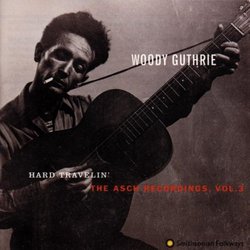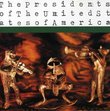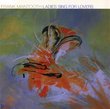| All Artists: Woody Guthrie Title: Hard Travelin': The Asch Recordings, Vol. 3 Members Wishing: 1 Total Copies: 0 Label: Smithsonian Folkways Original Release Date: 5/19/1998 Release Date: 5/19/1998 Genres: Country, Folk, Pop Styles: Classic Country, Traditional Folk Number of Discs: 1 SwapaCD Credits: 1 UPCs: 093074010228, 009307401022 |
Search - Woody Guthrie :: Hard Travelin': The Asch Recordings, Vol. 3
 | Woody Guthrie Hard Travelin': The Asch Recordings, Vol. 3 Genres: Country, Folk, Pop Hard Travelin' is the third entry in a four-volume series of Woody Guthrie's Asch Recordings; mostly topical songs he recorded for Moses Asch's various Folkways-related labels in the 30's and 40's. Like the other volumes, ... more » |
Larger Image |
CD DetailsSynopsis
Amazon.com Hard Travelin' is the third entry in a four-volume series of Woody Guthrie's Asch Recordings; mostly topical songs he recorded for Moses Asch's various Folkways-related labels in the 30's and 40's. Like the other volumes, Travelin' boasts a number of familiar classics (such as the title track, "Vigilante Man," and "Talking Columbia") right alongside previously unreleased chestnuts ("Ladies Auxiliary" and "Union Maid"). The series is a must for Guthrie aficionados; not only for the rich catalog of songs, but for Guy Logsdon's extensive historical and biographical notes. Rock fans should note that we wouldn't have Bob Dylan, Phil Ochs, or Billy Bragg--or even the Sex Pistols, for that matter--if it weren't for Guthrie's pioneering political work with Asch. --Michael Ruby Similarly Requested CDs
|
CD ReviewsStill relevant after all these years... ewomack | MN USA | 10/15/2006 (5 out of 5 stars) "A changing economy and an increasingly technologized mainstream culture have made Woody Guthrie almost inaccessible to today's Americans. Never a rich man, he used to ramble around to dance halls, local radio shows, and political rallies. A headful of songs went with him. Along the way he witnessed labor riots, wars, dust storms, stifling poverty, and now deceased political ideologies. Much of his life reads like a vagabound's diary. The surreal experiences he relates in "Bound For Glory" sit well outside the purview of today's CD buying masses. Music has changed. America has changed. So why does Woody Guthrie still have relevance for the internet generation?
Testimonies of many of the twentieth century's greatest musicians helped exhume Guthrie's name from obscurity. Bob Dylan, Bruce Springsteen, John Mellencamp, U2, and others hailed Guthrie as America's musical spokesman for the disdvantaged. They sang his songs. He received the moniker "our first protest singer". In a now legendary story, a very young Bob Dylan visited the ailing and unknown Guthrie as he wasted away from Huntington's Chorea. "This Land is Your Land" became something of an alternate national anthem throughout the 1960s and 1970s. Kids sang it in school. The songs began to overshadow the man. Listeners soon realized that Guthrie embodied the concerns, ideas, and voices of his generation's underclass. He reveled in this niche though it never brought him expansive fame or gushing wealth. Maybe those who listen to Guthrie today feel that he also speaks for them? After all, Americans still struggle with employment, politics, corruption, and war. Only the details have changed. Though few of today's consumers would qualify as "ramblers", we still identify with Guthrie when he sings "I've been havin' some hard travelin', I thought you know'd." Guthrie isn't remebered for his voice or musical ability, but for capturing a piece of America that no one had previously captured. And that piece still exists, though in a slightly altered form. This CD, the third in the Asch series, showcases Guthrie's timelessness. The song "Hard Travelin'" sets the mood for the CD's subsequent twenty seven songs. They deal with tragedies, politics, struggles, impending war, and voices rarely heard. "Ludlow Massacre" and "1913 Massacre" tell of labor disputes that turned deadly. "Farmer-Labor Train" was written for the unsuccessful campaign of Henry Wallace. The hypnotic "Miner's Song" depicts the miner's life by repeating the line "I Dig My Life Away-o." Many of the songs relate to World War II. "Better World A-Comin'" promises that the troubles will eventually pay off (though Guthrie also throws in references to unions). Guthrie also altered the lyrics of one of his best known songs, "So Long, It's Been Good to Know You", for the ominous war that affected every American. Not only that, Guthrie and Cisco Houston sing a new version of "When the Saints Go Marching In" that foreshadows the coming allied victory. "Miss Pavlichenko", recorded live in 1946, eulogizes a women that killed 257 Nazis during the siege of Leningrad. Patches of humor also peek through the heavy themes. "Howdjadoo" hilariously explores how people introduce each other. "Mean Talking Blues" is a hyperbolic character study of an ornery old cuss: "If I ever done a good deed, I'm sorry of it." "Ladies Auxillary" satirizes the hats of the day and the hat craze: "You can sell a woman anything if you tell her it's a hat." Guthrie wrote much of the words and music on this CD. For some he put his own words to other's music, as was the folk music custom of the day. Twenty-seven songs aptly demonstrate Guthrie's importance and continuing relevance. Some of his most famous tunes are included here. This CD, along with volume one of this series, represents the best introduction to Woody Guthrie currently available. He will doubtless continue to represent and speak for the unprivileged of generations to come." |









